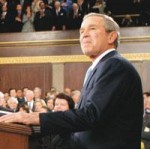Iraq, climate change highlight State of the Union address

With polls reflecting waning popular support, President George W. Bush took the stage Tuesday to deliver his penultimate State of the Union address.
In his speech, Bush addressed a new proposal to expand health care coverage, addressed “global climate change” and again focused on the need to reduce America’s dependence on foreign oil.
He also spoke on the Iraq war, reiterating his resolve to stay the course.
“Our country is pursuing a new strategy in Iraq – and I ask you to give it a chance to work,” Bush said.
Bush began the speech by reprising his role of a reconciler of the politically divided Congress by recognizing and congratulating Nancy Pelosi on her role as speaker of the House of Representatives.
“I have the high privilege and distinct honor of my own as the first president to begin the State of the Union message with these words: ‘Madame Speaker,'” Bush said.
He went on to praise the economy, promising to balance the federal budget within five years through spending discipline rather than tax hikes.
Bush said that as a result of the No Child Left Behind Act’s success, students are performing better in reading and math, and minority students are closing the achievement gap. He called on Congress to reauthorize the act and build upon its successes by empowering local leaders to fix failing schools.
Bush also asked Congress to allow parents the right to choose which schools their children attend, which political science professor Steven Tauber characterized as a reference to Bush’s voucher program. This program was upheld in the federal Supreme Court but was repealed on a state level in Florida as a violation of the separation of church and state.
“Most of the speech was kind of general and leaned toward issues that everyone supports. The vouchers issue was one of the more bold statements that I thought (Bush) made,” Tauber said. “They’re very controversial in terms of policy, in terms of the entire notion of somebody having to pay taxes and then that tax money goes to somebody else for their religious indoctrination.”
Bush divided his time between domestic and foreign affairs; however, the situation in the Middle East took center stage in both the State of the Union and the minority rebuttal.
“We know with certainty that the horrors of that September morning were just a glimpse of what the terrorists intend for us unless we stop them,” Bush said.
The Democratic rebuttal was delivered by Virginia Sen. Jim Webb, who served under President Ronald Reagan as a Republican but became a Democrat as a reaction to the situation in Iraq.
“The war’s costs to our nation have been staggering,” Webb said. “Financially, the damage to our reputation around the world, the lost opportunities to defeat the forces of international terrorism and especially in the precious blood of our citizens.”
Tauber said the Democratic response was one of the strongest he could remember, but added that the minority response often pales in comparison to the pageantry of the State of the Union address.
According to Tauber, it is Reagan who turned the State of the Union into “an event” rather than a commonplace presidential address.
“Reagan recognized the opportunity to make it a televised event in the ’80s and humanized it by pointing out ordinary people who do something remarkable,” Tauber said. “But ultimately, it’s really justrhetoric and theater and showmanship.”
Asst. News Editor David Guidi contributed to this report.





